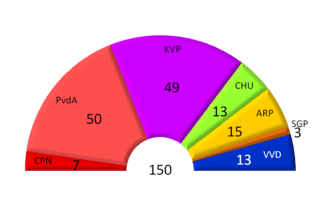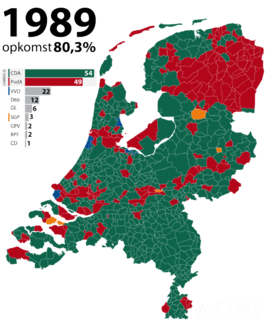
Jan Pieter "Jan Peter" Balkenende Jr. is a retired Dutch politician who served as Prime Minister of the Netherlands from 22 July 2002 to 14 October 2010. He is a member of the Christian Democratic Appeal (CDA).

General elections were held in the Netherlands on 22 January 2003.

The Catholic People's Party was a Catholic Christian democratic political party in the Netherlands. The party was founded in 1945 as a continuation of the Roman Catholic State Party, which was a continuation of the General League of Roman Catholic Caucuses. During its entire existence, the party was in government. In 1980 the party merged with the Anti-Revolutionary Party (ARP) and the Christian Historical Union (CHU) to form the Christian Democratic Appeal (CDA).

General elections were held in the Netherlands on 13 June 1956. For the first time, the Labour Party (PvdA) emerged as the largest party, winning 50 of the 150 seats in the House of Representatives.

General elections were held in the Netherlands on 28 April 1971. The Labour Party (PvdA) emerged as the largest party, winning 39 of the 150 seats in the House of Representatives. The elections were the first without compulsory voting, causing a sharp fall in voter turnout, down to 79.1% from 94.9% in the 1967 elections. Barend Biesheuvel of the Anti-Revolutionary Party (ARP) became Prime Minister, leading the first Biesheuvel cabinet.

Early general elections were held in the Netherlands on 29 November 1972. The Labour Party (PvdA) remained the largest party, winning 43 of the 150 seats in the House of Representatives.

General elections were held in the Netherlands on 25 May 1977. The Labour Party remained the largest party, winning 53 of the 150 seats in the House of Representatives. Following the election, it took 208 days of negotiations to form a new government. This was a European record for longest government formation that stood until after the 2010 Belgian general election. The Christian Democratic Appeal was formed by the Anti-Revolutionary Party (ARP), Christian Historical Union (CHU) and the Catholic People's Party (KVP) in 1976. The first joint party leader was a member of the KVP, Dries van Agt.

Early general elections were held in the Netherlands on 8 September 1982. The Labour Party emerged as the largest party, winning 47 of the 150 seats in the House of Representatives.

General elections were held in the Netherlands on 21 May 1986. The Christian Democratic Appeal (CDA) emerged as the largest party, winning 54 of the 150 seats in the House of Representatives.

General elections were held in the Netherlands on 6 September 1989. The Christian Democratic Appeal (CDA) remained the largest party, winning 54 of the 150 seats in the House of Representatives. This chamber served for 4 years and 7 months, the longest tenure of any modern Dutch parliament.

General elections were held in the Netherlands on 3 May 1994. The Labour Party emerged as the largest party, winning 37 of the 150 seats in the House of Representatives. The election resulted in significant losses for both the Labour Party and the Christian Democratic Appeal. The two liberal parties, People's Party for Freedom and Democracy and Democrats 66 made large gains, whilst two pro-elderly parties and the Socialist Party all passed the electoral threshold to win seats.

General elections were held in the Netherlands on 6 May 1998.

General elections were held in the Netherlands on 22 November 2006 following the fall of the Second Balkenende cabinet. The elections proved relatively successful for the governing Christian Democratic Appeal (CDA) which remained the largest party with 41 seats, a loss of only three seats. The largest increase in seats was for the Socialist Party (SP), which went from nine to 25 seats. The main opposition party, the social-democratic Labour Party (PvdA) lost nine of its 42 seats, while the right-liberal People's Party for Freedom and Democracy (VVD) and the progressive liberal Democrats 66 lost a considerable portion of their seats, six of 28 and three of six, respectively. New parties, such as the right-wing Party for Freedom (PVV) of former VVD MP Geert Wilders and the animal rights party Party for the Animals (PvdD) were also successful, with the PVV winning nine seats and the PvdD winning two, thereby becoming the first animal rights group to enter a European parliament.

The First Lubbers cabinet was the cabinet of the Netherlands from 4 November 1982 until 14 July 1986. The cabinet was formed by the political parties Christian Democratic Appeal (CDA) and People's Party for Freedom and Democracy (VVD) after the election of 1982. The right-wing cabinet was a majority government in the House of Representatives. It was the first of three cabinets of Ruud Lubbers (CDA) as Prime Minister, with Gijs van Aardenne of the People's Party for Freedom and Democracy serving as Deputy Prime Minister.

The Second Van Agt cabinet was the cabinet of the Netherlands from 11 September 1981 until 29 May 1982. The cabinet was formed by the political parties Christian Democratic Appeal (CDA), Labour Party (PvdA) and the Democrats 66 (D'66) after the election of 1981. The centre-left grand coalition cabinet was a majority government in the House of Representatives. It was the second of three cabinets of Dries van Agt, the Leader of the Christian Democratic Appeal as Prime Minister, with Joop den Uyl the Leader of the Labour Party and Jan Terlouw the Leader of the Democrats 66 serving as Deputy Prime Ministers.

Parliamentary elections were held in Slovakia on 17 June 2006. Direction – Social Democracy emerged as the largest party in the National Council, winning 50 of the 150 seats. Its leader Robert Fico was appointed Prime Minister on 4 July 2006, leading a three-party coalition.

The Fourth Balkenende cabinet was the cabinet of the Netherlands from 22 February 2007 until 14 October 2010. The cabinet was formed by the political parties Christian Democratic Appeal (CDA), Labour Party (PvdA) and the Christian Union (CU) after the election of 2006. The grand coalition cabinet was a majority government in the House of Representatives.

Early general elections were held in the Netherlands on 12 September 2012 after Prime Minister Mark Rutte handed in his government's resignation to Queen Beatrix on 23 April. The 150 seats of the House of Representatives of the Netherlands were contested using party-list proportional representation. The People's Party for Freedom and Democracy (VVD) received a plurality of the votes, followed by the Labour Party (PvdA).























